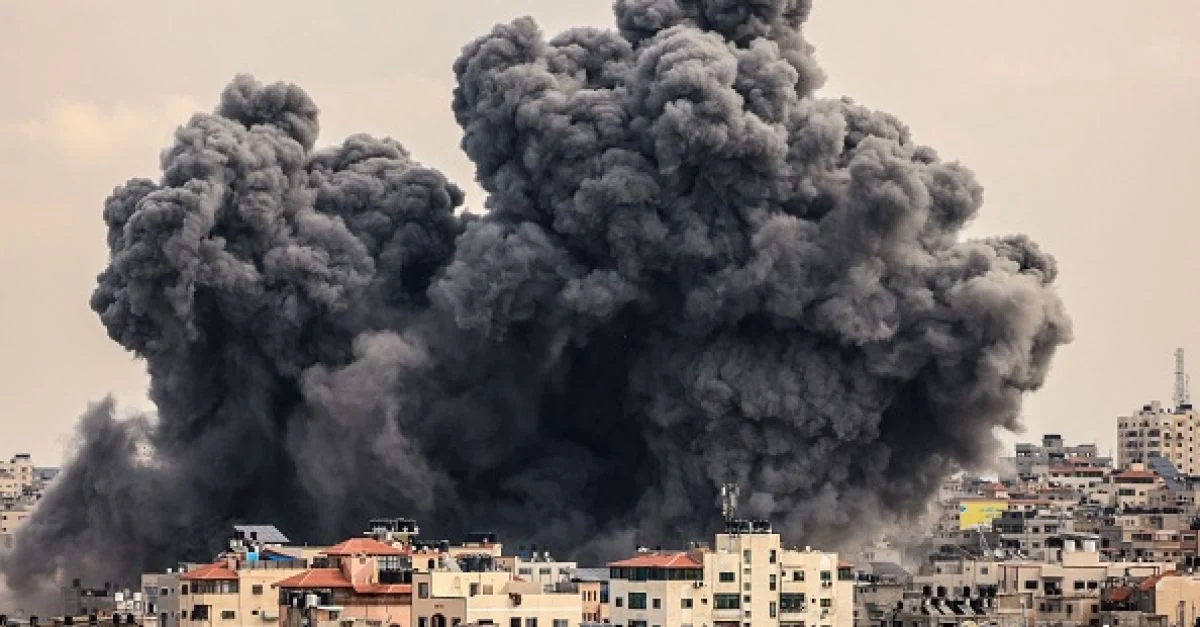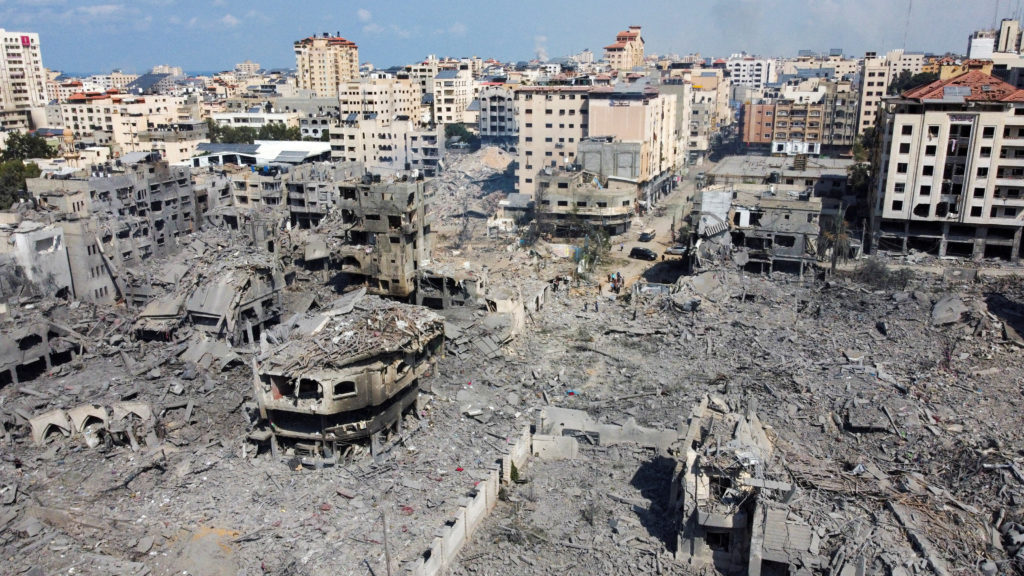Editorial
Israel-Gaza War: Ending Carnage On Journalists

On October 13, 2023, a group of journalists had assembled at the border between Israel and southern
Lebanon with the objective of transmitting real-time updates to the Reuters news agency. They were in the process of reporting on a skirmish between Israeli soldiers and the Lebanese militant organisation, Hezbollah, when an Israeli shell unexpectedly landed close to their location, resulting in the tragic death of a videographer and injuries to six other individuals. This incident is a distressing reminder of the risks that journalists are exposed to in their pursuit of disseminating accurate information to the public.
The above tragedy is now among the numerous instances that exemplify the unparalleled impact that the Israel-Hamas War has had on journalists since its commencement on October 7. As of January 6, 2024, international organisations such as the Committee to Protect Journalists (CPJ) and Reporters Without Borders (RSF) said that a minimum of 77 journalists and media personnel had lost their lives out of the staggering total of over 23,000 casualties since the onset of the conflict, marking more than 22,000 Palestinian fatalities in Gaza and the West Bank, along with 1,200 deaths in Israel.
According to CPJ, the initial weeks of this war had been the most lethal timeframe for journalists reporting on conflicts since 1992, when the organisation commenced monitoring. Journalists stationed in Gaza City, who are covering this conflict, are operating under highly hazardous circumstances attributable to the initiation of Israeli airstrikes and a ground invasion, as well as the presence of power outages and disruptions in communication channels. Moreover, they are exposed to perilous risks such as physical attacks, arrests, censorship, and potential harm to their family members.
In a particular occurrence, a news reporter affiliated with the Qatar-owned television network, Al Jazeera, Wael Al-Dahdouh, was engaged in a live broadcast showcasing the distressed area on the 28th of October, when he received the devastating news of his wife, teenage son, and daughter falling victim to an Israeli airstrike. Shortly thereafter, the live footage captured Dahdouh’s entrance into Al-Aqsa Hospital as he sought to locate his son’s lifeless body in the hospital’s morgue.
Similarly, a journalist and correspondent for the Palestinian Authority-funded broadcaster, Palestine TV, Abu Hatab, along with 11 members of his family, was tragically killed in an Israeli airstrike on their residence in Khan Younis, located in the southern Gaza Strip. These distressing events were reported by the Palestinian Authority’s official news agency, Wafa, and the news outlet, Roya News, based in Amman.
On October 20, it was officially announced by The Times of Israel and the International Federation of Journalists (IFJ) that Israeli journalist, Idan, was found dead after his body was retrieved. Idan, who worked as a photographer for the Israeli newspaper, Ynet, was initially reported as missing following a Hamas attack on Kibbutz Kfar Aza on October 7, which resulted in the tragic loss of his wife and daughter. CPJ has verified that he was indeed working on the day of the attack. The list is endless.
Reporters Without Borders has recently urged the International Criminal Court (ICC) to conduct an investigation into the deaths of eight Palestinian journalists who were allegedly killed during Israel’s bombing of civilian areas in the Gaza Strip. Additionally, the organisation highlighted the death of an Israeli journalist in the surprise attack by Hamas in southern Israel. The complaint also mentions the intentional destruction, either fully or partially, of over 50 media facilities in Gaza since the war began.
The severity of the killings of journalists necessitates the intervention of the ICC for thorough investigation. We earnestly plead with all parties involved in armed conflicts to refrain from deliberately targeting journalists who courageously carry out their essential duties during times of crises. Although journalists have always played a crucial role in war situations, their work holds even greater significance during the Israel-Hamas war because of the surge in disinformation and the ease with which it can be spread and amplified.
In the ongoing conflict between Russia and Ukraine, a total of 17 journalists have lost their lives since the war commenced in 2022. The most recent reported incident occurred in May, claiming the life of French cameraman, Frederic Leclerc-Imhoff.
Regrettably, the US-led invasion of Iraq initiated a series of hostilities that proved especially perilous for journalists, establishing a distressing pattern that persists to this day. According to CPJ, a staggering 283 journalists have met their untimely demise in Iraq since 2003. Notably, this figure includes 11 journalists who perished during the first month of the war, spanning from March to April 2003.
Despite the globally accepted view that journalists ought to operate freely within conflict zones, the Israeli-Hamas ongoing conflict starkly disrupts this assumed privilege. The vicious circle of violence cruises on incessantly, shedding endless innocent blood. All inter-governmental, non-governmental organisations (NGOs), and lobby groups should collaborate and work against the dreadful carnage of journalists. Their voices, condemnation, and advocacy may prove pivotal in pushing both the Israeli government and Hamas towards embracing mutual respect for journalists.
The killing of journalists in the Israel-Hamas war calls for an immediate and aggressive response. The international community, media houses, and governments can bring about the change needed to safeguard journalists’ lives. In the long run, these measures will not only instil a culture of respect for members of the press within conflict zones but also ensure even war scenarios do not obscure the light of journalism. Thus, the world owes a lot to journalists; it is high time we guaranteed their protection and survival amid such turmoil as the Israel-Hamas conflict.
Editorial
New Federal Varsity In Ogoni

President Bola Ahmed Tinubu has made history by signing into law a bill that establishes the Federal Univer-
sity of Environment and Technology in Ogoni, Rivers State. This significant occasion marks a bold step forward not only for the Ogoni people but also for the Niger Delta region and Nigeria as a whole. It signifies a commitment to education, environmental sustainability, and technological advancement.
For the Ogonis, who have long been impacted by environmental challenges, the university represents a beacon of hope. It is more than just bricks and mortar; it is a symbol of empowerment and a pathway to a brighter future. This development is akin to a seed, planted with the promise of a flourishing harvest of skilled professionals.
The university’s emphasis on environmental technology is extremely important, especially given Nigeria’s climate crisis. Education plays a crucial role in developing sustainable solutions. The institution will provide students with the necessary skills and knowledge to address the environmental challenges affecting the Niger Delta region and beyond. This will have a momentous impact.
Signing the bill, the President praised the Ogoni people’s resilience and unity. He stressed that the institution would mark a “significant milestone in our national journey towards environment justice, education and sustainable development”. Tinubu said the university is a reaffirmation of his administration’s “unwavering commitment to the people of Ogoni, the Niger Delta and the nation as a whole. For decades, the Ogoni people have been at the forefront of fight for environmental restoration and sustainable development, shaping both national and global conversation of these critical issues.
“By signing this bill into law, we are taking a decisive step towards addressing historical grievances and creating new opportunities for learning, growth and prosperity. The university will serve as a centre of excellence, equipping young Nigerians with the knowledge and skill to tackle present environmental challenges, drive clean energy solutions and contribute to our national sustainable economic development.”
We commend President Tinubu for his visionary decision to establish the much-needed institution aimed at fostering development and progress. This initiative is a testament to his commitment to addressing critical social and economic knots and creating opportunities that will benefit the people. The President has laid a solid foundation for sustainable growth while demonstrating a genuine desire to empower and advance the nation’s collective interests.
In addition to his commendable action, we applaud Tinubu for initiating peace talks to bring stability and reconciliation to the troubled area. The decision to engage in constructive dialogue demonstrates a deep understanding of the relevance of inclusive governance and the role of peace in fostering meaningful development. For decades, Ogoni has endured turmoil and neglect, impeding its potential and the return of oil exploration activities.
By opening the door to peaceful negotiations, the President has made a bold and necessary move towards healing fractured relationships and fostering trust among stakeholders. This initiative holds the promise of ensuring that the voices and needs of the Ogonis are heard and respected. We urge all parties involved to seize this golden opportunity for lasting peace and progress. It is only through unity and mutual respect that the full potential of Ogoni, and by extension the nation, can be realised.
As steps are taken to acknowledge and remediate the damage caused by years of oil exploration and production, the Ogonis must reciprocate Mr. President’s gesture by fostering a climate of equanimity and stability. This will ultimately pave the way for the resumption of oil exploration and production. This is not a call to forget the past, but a pragmatic recognition that meaningful change and sustainable development require a collaborative approach.
The Federal Government has a responsibility to ensure that all academic disciplines offered by the new university are fully accredited to maintain the integrity and quality of the school. Without proper accreditation, the institution risks producing graduates who are ill-equipped to compete in the global workforce or contribute substantially to national development. Accreditation serves as a benchmark that ensures programmes meet academic standards and adhere to best practices across various fields of study.
Staff recruitment should be conducted carefully, as the individuals brought into a team can greatly influence an organisation’s performance, culture, and long-term success. The primary focus of recruitment efforts at the university should be on attracting the best candidates who possess the necessary skills, qualifications, experience, and values. Merit should be the guiding principle in decision-making throughout the hiring process, rather than favouritism or personal bias.
For a nation to thrive in the 21st century, a strong higher education system is not only desirable, but essential. Universities serve as the catalysts for innovation, the breeding grounds for future leaders, and the foundations of a knowledge-based economy. The Federal Government must acknowledge this vital role and take intentional actions to properly fund the university in Ogoni and develop infrastructure to ensure it meets international standards. Neglecting this responsibility would put its future prosperity and global competitiveness at risk.
This institution must not suffer the same fate as other federally-owned universities that have been left to decay. That will be a disservice to its purpose and potential. Many government-owned universities in the country have struggled with dilapidated infrastructure, underfunding, insufficient staffing, and interruptions caused by industrial actions due to unpaid wages or poor working conditions. These challenges have led to declining standards in education, putting both students and staff at a disadvantage. The Ogoni University must not be another victim of this worrying trend.
Editorial
HIV, Transiting From Donor Dependence

The initial announcement by United States President, Donald Trump, to cut funding for international
HIV/AIDS initiatives sent shockwaves through the global health community. In Nigeria, a country facing a significant HIV/AIDS burden, the potential consequences were dire. However, the subsequent waiver granted by the administration has provided a lifeline for the millions of Nigerians who rely on the President’s Emergency Plan for AIDS Relief (PEPFAR) for their treatment and support.
PEPFAR has been an important partner in Nigeria’s fight against HIV/AIDS. Since its inception in 2003, PEPFAR has committed more than $7.8 billion to the country, catering to approximately 90 per cent of HIV treatment requirements. With this funding, Nigeria has been able to enhance its HIV prevention, treatment and support services and has witnessed a reduction in HIV/AIDS deaths.
The waiver granted by the Trump administration guarantees that PEPFAR’s life-saving medicines and medical services will continue to reach the needy. Antiretrovirals (ARVs) are the most common type of medicine used to treat HIV and reduce the virus’ spread. Through the provision of ARVs, PEPFAR helps prevent the spread of HIV and enhances the quality of life of those with the condition.
Although Nigeria was recently exempted from the requirement, the signs are evident: the country has to graduate from dependence on donor funds for its HIV/AIDS control programmes. Over the years, partners including the U.S. government have been central to the provision of treatment to people living with the virus. However, it is time for Nigeria to own its national response to HIV/AIDS.
Nigeria’s HIV/AIDS burden remains critical, accounting for 10 per cent of the global total. In 2023 alone, there were 75,000 new infections and 45,000 HIV-related deaths. The battle against Mother-to-Child Transmission remains challenging, with only 35 per cent of the target 75 per cent being met. Nearly 1.7 million Nigerian children have been orphaned due to HIV. Vulnerable populations, especially women and children, continue to disproportionately suffer.
To transition away from donor dependence, a multifaceted approach is necessary. Firstly, the country must increase its domestic financing for HIV/AIDS programmes. This can be accomplished through innovative funding mechanisms, such as leveraging public-private partnerships and exploring local revenue sources. Secondly, the government needs to strengthen its healthcare system to ensure equitable access to testing, treatment, and care. This involves expanding access to antiretroviral drugs, investing in community-based models, and addressing the stigma associated with HIV.
Thirdly, Nigeria must prioritise prevention efforts. This entails promoting condom use, providing comprehensive sexual education, and increasing awareness about the risks and modes of transmission. By focusing on prevention, the country can decrease the incidence of HIV infections and ultimately lessen the burden on its healthcare system.
Finally, Nigeria should develop a sustainable human resource strategy for its HIV/AIDS response. This involves training and equipping healthcare workers, engaging community volunteers, and empowering people living with HIV to advocate for their rights. A well-trained workforce is essential for delivering high-quality services and ensuring the long-term success of the response.
The transition beyond donor dependence is a complex but necessary journey for the country. By increasing domestic financing, strengthening healthcare systems, prioritising prevention, and investing in its human resources, the country can create a sustainable and effective response to HIV/AIDS. Also, the government should consider alternative funding mechanisms, such as increased domestic funding, public-private partnerships, and philanthropic initiatives. The time to act is now, for the well-being of present and future generations.
Nigeria’s National Agency for the Control of AIDS (NACA) has made momentous strides in combating HIV/AIDS, including expanding access to testing, treatment, and education. However, challenges persist, hindering the effectiveness of these efforts.
One major obstacle is limited access to healthcare facilities, particularly in rural areas. This impedes timely diagnosis and treatment, reducing the likelihood of optimal outcomes for those living with HIV. Additionally, stigma surrounding the disease remains a formidable barrier, preventing individuals from seeking testing and care. Inadequate awareness campaigns further contribute to low testing rates and delayed diagnosis.
Addressing these challenges requires concerted action by the government and stakeholders. Allocation of adequate funding is crucial to expand healthcare infrastructure and ensure the availability of essential services. Moreover, targeted interventions to reduce stigma and promote awareness are vital for increasing testing and early detection.
Collaboration between civil society organisations and grassroots movements is also essential for advocating for protection of HIV funding. Advocacy campaigns can mobilise public support and pressure lawmakers to prioritise the fight against HIV/AIDS. By addressing these challenges and ensuring sustainable funding, Nigeria can depend less on donor countries, drastically reduce HIV transmission, and provide the necessary care to those affected by the disease.
Editorial
Israel-Gaza War: Sustaining The Ceasefire

-

 Sports4 days ago
Sports4 days agoEaglesite Football Academy Targets Grassroots Dev
-

 News4 days ago
News4 days agoRelatives Of Deceased Pension Contributors Get N82bn –PenCom
-

 Niger Delta4 days ago
Niger Delta4 days agoPolice Arrest Boy, 13 For Using Gun To Threaten Colleagues
-

 Opinion4 days ago
Opinion4 days agoEFCC’s Alternative Approach Against Cybercrime
-
News4 days ago
NDLEA Busts Drug Kingpins In PH, Lagos As Suspects Excrete 125 Heroin Wraps
-

 Oil & Energy4 days ago
Oil & Energy4 days agoOPEC+Commits To Monitoring Oil Production Adjustment
-

 Business4 days ago
Business4 days agoNigeria, Still Africa’s Largest Economy – World Bank
-

 News4 days ago
News4 days agoSoludo Rebagged FG Rice Shared To APGA Members-APC

